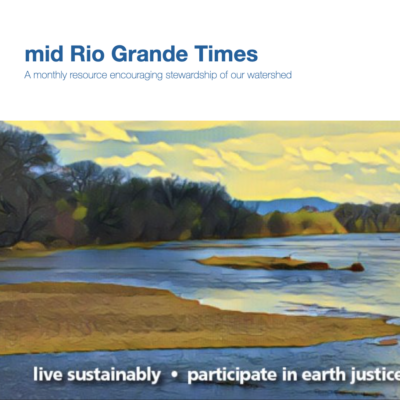In many areas, local journalism is in crisis. It is difficult to fund voices telling the stories unique to a community. As the Brookings Institute puts it, this lack has, “deprived communities of an institution essential for exposing wrongdoing and encouraging civic engagement.” Lack of information about local environmental issues is one example of this critical need.
Albuquerque Mennonite Church (AMC), Albuquerque, New Mexico, has been working on issues related to their watershed for the past ten years. The region is in an extreme drought, complicated by climate change and the lack of a plan on how to respond. Church participants saw a need for a monthly online magazine that would be both practical and provocative and that could engage more people in the issues affecting the Mid Rio Grande watershed.
Faith in Action Committee ignites action
The idea grew from a Faith in Action committee meeting where members brainstormed about what each felt passionate about. It was a fruitful discussion that yielded the online magazine, quarterly river trips on the equinox and solstice and deepened support for Indigenous issues.
The Mid Rio Grande Times encourages local residents to live sustainably, participate in earth justice, and confront harmful policies. Members of AMC and the community have been involved in the project by writing articles, editing, and photography. The congregation has applied for and been awarded a $1000 Green Mustard Seed grant to further develop the website.
Local experts feature prominently in the Mid Rio Grande Times. Reading a recent interview, one learns that New Mexico is a hotspot for wild bee diversity. Over a thousand species are indigenous to New Mexico. The previous issue features local sustainable farmers, and another describes a visit to the Indian Pueblo Cultural Center. Readers scanning the front page of the New York Times are unlikely to come by this level of detail about their watersheds.
Susanne Brown, a longtime member at Albuquerque Mennonite who works on the Times, says she hopes her congregation will gain a greater knowledge of the history of local and federal laws which have contributed to the current environmental situation.
“I hope we and our community will be better able to respond individually and collectively to this crisis,” she says.
